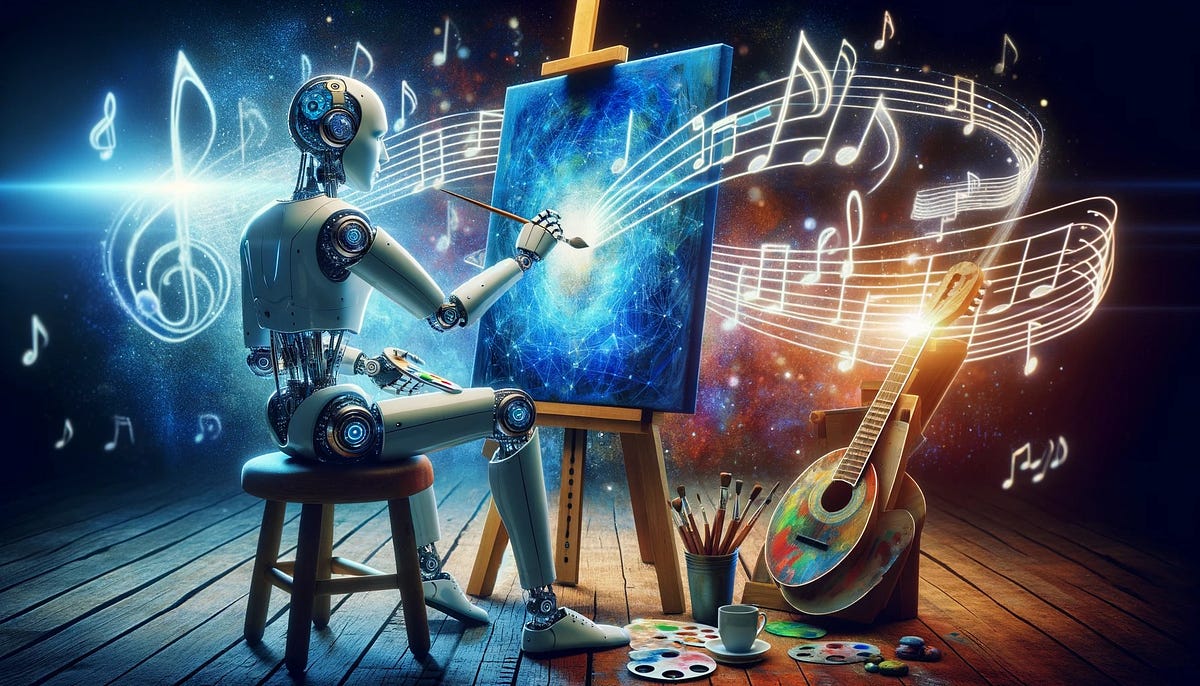May 23, 2024
Introduction
Artificial intelligence (AI) technology continues to earn accolades for its innovation and efficiency. While AI has been transformative across various industries, including education, medicine, and entertainment, it is also making significant inroads into the creative sectors. Many might still associate AI predominantly with STEM fields—science, technology, engineering, and medicine. However, creative industries are now riding the innovation wave, ushering in a new era of digital art that is redefining the boundaries of human creativity.
AI’s Impact on Visual Arts
Today's artists are increasingly incorporating AI tools into their work, yet philosophical questions about originality and creativity persist. Art has always been a unique human expression, so what does it mean when AI can also create art? Understanding AI art generation helps to answer this. Generative AI accesses vast amounts of art history and, when guided by human input, can produce art that meets specified parameters. This collaboration between human and AI results in artworks that are both innovative and unique.
AI in painting and digital art creation improves with every software update. While AI can sometimes produce astounding results, the human touch remains integral to the final piece. This synergy between human creativity and AI capability often results in superior art that would be impossible to achieve otherwise.
AI in Music Composition and Production
Music, another deeply expressive art form, is also undergoing a transformation thanks to AI. The music industry has been integrating AI for years, with platforms like Meta’s Audiocraft and OpenAI’s MuseNet leading the way. These tools democratize music creation, making it accessible to artists and users of all levels.
AI enhances music production rather than replacing the human element. By processing large datasets of existing music, AI algorithms can identify patterns and structures that inform new compositions. This collaboration continues through the editing process, resulting in music that blends human creativity with AI precision.
AI-generated music is becoming more mainstream, with potential applications beyond entertainment. For instance, AI in music composition could have therapeutic benefits, offering new avenues for holistic health solutions. As these tools gain wider acceptance, their impact on the music industry will only grow.
Revolutionizing Film and Animation with AI
AI has long been a part of the film and animation industry, but recent advancements have significantly accelerated its integration. From screenplay writing and video editing to special effects and movie production, AI is impressing filmmakers, producers, and audiences alike. Technologies like voice cloning and digital re-aging are gaining attention in movie-making and advertising.
AI algorithms are transforming the film industry from the ground up. Advanced machine learning technologies analyze movie critic commentaries and industry expertise to predict a film's reception. Script analysis tools, such as ScriptBook, help determine the potential success of a movie script, while platforms like Cinelytic assist with story structure, character development, and other essential details.
AI-assisted films and fully generated animations, like "The Frost," are becoming more common. While these films might not always hit the big screen, they signify a new genre of filmmaking driven by AI technology.
Fears and Expectations of AI in Creative Arts
Common concerns about AI in the arts include fears of replacement and questions about the quality of AI-generated work. Art is inherently subjective, and the saying "beauty is in the eye of the beholder" applies here. Just because AI might produce art faster doesn't mean it will be better. AI is a tool that, when used effectively, can enhance human creativity rather than overshadow it.
Debates about AI's role in creativity often touch on its perceived human-like qualities. Questions about AI's self-awareness, agency, and the ethical implications of its use continue to spark intense discussions among experts and the public alike. While these concerns are valid, the broader picture of a future where AI and human creativity coexist is becoming clearer.
Challenges and Ethical Considerations
The integration of AI in the creative arts is not without challenges. AI digital art, such as AI Photoshop, has caused some controversy, forcing the creative community to rethink the nature of collaboration with AI. Questions about AI as a creative partner versus a tool remain unresolved.
Originality and copyright issues are also significant concerns. Who owns the rights to AI-generated art? What are the legal implications of AI-created content? These questions require a robust legal framework that protects both artists and users while fostering innovation.
Potential and Future Trends
AI is poised to accelerate the creative process, but it still has limitations. Human imagination is irreplaceable, particularly in starting new projects from scratch. As AI tools continue to evolve, they will enable new forms of art and entertainment, integrating technologies like virtual reality (VR) and augmented reality (AR). Imagine experiencing an AI-generated film as your favorite character, thanks to VR technology—a glimpse into a futuristic creative landscape.
The art, music, and film industries will need to have serious conversations about how these tools should complement human creativity rather than replace it. The goal should be to create a harmonious partnership that enhances the creative process.
Summary
The transformative impact of AI on the creative world is something to embrace. As these technologies advance, staying abreast of developments will be crucial. The aesthetic arts have as much to gain from AI as any other industry, and as AI tools become more integrated into creative processes, their potential will only grow.
Exploring the possibilities offered by AI in creative industries is an ongoing journey. The major takeaway is that the blend of human creativity and AI technology can lead to extraordinary results, making the exploration of these tools a worthwhile endeavor.




